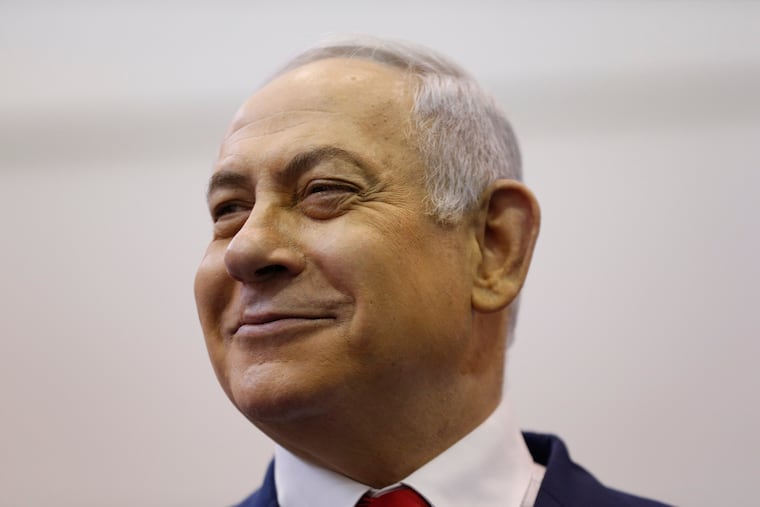Netanyahu victory in Israel’s election means the end of illusions about a Palestinian state | Trudy Rubin
Forget Kushner's peace plan: With Trump's help, Israel is now headed towards a one-state solution in which Arabs outnumber Jews.

Tuesday’s election of Benjamin Netanyahu to a fifth term as Israeli prime minister will have a dramatic impact on Israel’s future that many Americans are unaware of.
Before the vote, Netanyahu vowed to start extending Israeli sovereignty over the West Bank, home to 2.8 million Palestinians, if he won reelection.
With his victory, Israel now appears headed toward the effective creation of one state between the Jordan River and the Mediterranean — a state in which Palestinian Arabs will outnumber the Jewish population.
Either Israel then grants Palestinians the vote, creating a binational state, or it rules over a majority of mostly disenfranchised Arabs. Even Israeli leaders have referred to this prospect as a form of “apartheid.”
This is the road down which Netanyahu appears to be heading, confident of the support of President Trump,
For the past three decades, Israel hewed in principle to the idea of a peace process that would ultimately result in two states, one Palestinian, one Israeli, living side by side. The peace process has been frozen for years and the Israeli public soured on it after Palestinian terrorist attacks in the 2000s and the Hamas takeover of Gaza.
Over the past several years, however, Israel under Netanyahu had practiced a kind of creeping annexation, legalizing one-time “illegal” settlements on private Palestinian land. and extending Israeli sovereignty over aspects of settlers’ education and economy on the West Bank.
Moreover, Netanyahu never made a secret of his disdain for the two-state idea, endorsing only the idea of a “state minus” that would permit few sovereign rights and only apply to patches of the West Bank.
Yet, there were key reasons many top Israeli generals and security experts wanted to keep the possibility of two states alive for the future — for a time when the Mideast region might become more stable and new Palestinian leadership could emerge.
“There is a big difference between de facto and de jure annexation, which would mean a huge change in the way Israel would be treated in the international community,” says Gilead Sher, chief of staff to former Israeli Prime Minister Ehud Barak. Most nations adhere to U.N. resolutions that consider the West Bank and Gaza to be occupied territory. Even Arab nations that now recognize or do business with Israel would reject annexation.
Moreover, annexation would likely bring an end to essential cooperation between Palestinian security forces and Israel, already under strain due to the frozen peace process. “Once security coordination ends, you would have a vacuum on the West Bank that would attract terrorists and spike an advance by Hamas,” says Nimrod Novik, a member of the Executive Committee of Commanders for Israel’s Security, a network of 280 retired Israeli generals.
“The Israeli Defense Forces would have to move [back] in,” says Novik, “and the donor community [which underwrites the Palestinian economy] would move out.” This would essentially require a formal Israeli reoccupation of the West Bank. The disbanding of Palestinian security forces could trigger an armed uprising.
Yet, for several reasons, Israeli analysts believe Netanyahu is likely to move down the annexationist road.
First, he will be under heavy pressure from small right-wing parties in any governing coalition and from annexationists within his own Likud party.
Second, Netanyahu is facing legal indictments for bribery, fraud, and breach of trust that he would like to head off. Israeli analysts believe he may try to swap a promise to begin annexation of settlements in return for legislative immunity until he steps down from office.
And third, annexationists have been buoyed by President Trump’s recognition of Israel’s annexation of the once-Syrian Golan Heights, leading them to believe they have a green light to do the same in the West Bank. “Annexationists consider Trump a historic opportunity,” says Sher. ”Netanyahu will have to give them something.”
Of course, this raises the question of whether and when Trump will put forward his long-awaited peace plan, crafted by First Son-In-Law Jared Kushner, and how this would square with annexation.
So far, speculation is that the plan will focus on economic aid to Palestinians, which is fine with the Israeli far right. “Annexationists believe you can buy the Palestinians off with economic improvements,” says Novik. “But there is no precedent in history where people gave up sovereign aspirations for money.”
Bottom line: the reelection of Netanyahu, if he keeps his pledge, is propelling Israel toward a one-state solution in which it will have to decide whether to accept a binational state or some form of apartheid. No matter who is to blame, no matter criticism of Palestinian failures, the population figures tell the tale.
In truth, neither Israeli Jews nor Palestinians believe a one-man, one-vote binational state could work. But the alternative is also disastrous. Sher says annexation would mark “the end of the Zionist dream of a democratic state for the Jewish people in Israel and the end of any possibility for a viable demilitarized state in most of the West Bank and the entirety of Gaza.”
Israel probably started down that road this week.